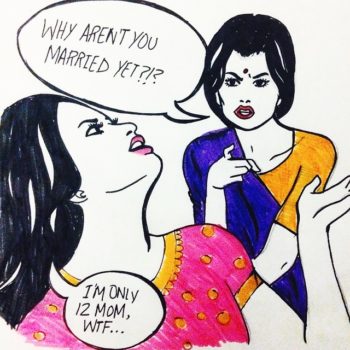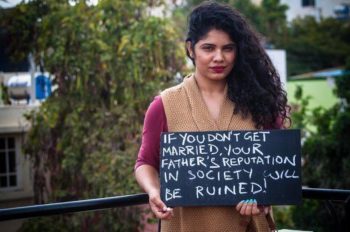
Single Women In India Are Staging A Revolution And Taking Back Their Autonomy
Lifestyle Oct 22, 2021
Being a single Indian (or South Asian woman for that matter) has been long weighed down by cultural expectations of marriage, questions of the person’s value all the while trying to navigate a patriarchal system that has permeated all aspects of society. Now there seems to be a revolution a foot. Indian women who are unattached are becoming the powerful force and they are taking back their autonomy, creating a powerful demographic for businesses and society to notice and respect.
“Ab teri baari hai.”
These words have made many a single Indian woman cringe.
In the past, Indian women needed to get married as this is what South Asian culture dictated. Back in the day, according to NCBI, Indian women were viewed as property that needed to be sold off before she was too old to fulfill her purpose. Then, being a successful woman meant you had to get married and you were to produce children. The woman’s focus was mainly within the household, which meant that she was financially reliant on her husband.

But, times are changing (maybe they’re changing for men too, but we’re focusing on the ladies here)!
Where are my singles ladies at?!
Today, women are out here living their best lives, providing for themselves, living on their own, and enjoying the peace that the world of singledom brings (I’m speaking from experience friends, don’t @ me).
In fact, in India, “there was a 39 percent increase in the number of single women – widows, never-married, divorced, abandoned – from 51.2 million in 2001 to 71.4 million in 2011,” reports Your Story.
Although these women may be either voluntarily or involuntarily single (e.g. widowers or abandoned), many of them are content with their relationship status as they prefer the freedom that comes with it, which allows them to find things to fill up their lives, such as friends and family, their careers, hobbies, having children on their own, and more. However, society is not as accepting.

Instead, the patriarchal ideologies that often rears its ugly head in South Asian culture tends to lurk around the corner for many of these women in the form of well-intended comments made by family and friends. For example, women may often be reminded that they are not getting any younger and need to find a husband while there are still eligible men to choose from so that they can have children before it’s too late.
No pressure, am I right?
Being an unmarried woman by choice, especially, is particularly taboo in South Asian culture for a multitude of reasons. First, according to The Week, single women In India experience “…legal and normative barriers in accessing and owning property and other assets besides accessing basic services such as education and health.” For example, single women who are trying to rent a property are often told what they can and cannot do, such as not having any dates over. The barriers single women face when trying to live on their own is even highlighted in Dear Zindagi (2016), where a female character in the film, Kaira is kicked out of her apartment as her landlord would prefer to only rent units out to married couples. But, even when women try to buy homes, they are pestered with questions on how they can afford it, given that women are supposed to be helpless without a man bankrolling their lives. Evidently, businesses continue to invalidate female autonomy as they reinforce the need for women to be attached to a man.
As well, single women in India may be alone in the sense that they do not have a “…partner and/or abandonment by their families, [which increases their risk of experiencing] sexual and gender-based violence.” In addition, She The People explains that it’s often assumed that this type of woman is a bad influence who should be kept away from so the youngsters in their lives don’t get the wrong idea. And, to top it all off, unmarried women are often viewed in a negative light and are labelled as being “…only career-oriented, sexually promiscuous, lonely and desperate, defective goods, and anti-men and anti-marriage.”

Constantly being bombarded with questions and opinions about your personal life from family, friends, and everyone else in-between can be emotionally and mentally draining. It can cause you to really dwell on why you’re single and if something is wrong with you. As well, constantly being told you’re not living your life the ‘right’ way or that you’re defective is harsh and who wouldn’t feel like crap about themselves after hearing that?
It is unfair that women face these hardships because of their relationship status, to say the least. However, despite these jarring occurrences, untrue stereotypes, and the constant pestering they face, Indian women are holding strong and forging their own paths, which is truly inspiring after so many years of being oppressed by the suffocating expectations of their South Asian culture.
How are single women in India changing the narrative?
Today, women in Indian (along with other South Asian countries) are choosing to be independent and finding “security and dignity” in being alone, as opposed to being coerced into a marriage that may be unfulfilling or abusive (either mentally, emotionally, or physically). This is important because as women strike out on their own, armed with their education, successful careers, and dollar, dollar bills y’all, they are breaking down the idea that women are defined by marriage and motherhood. But, how exactly are Indian women forging their own paths, you ask? I’m so glad you asked – let me explain:
- Real Estate: Girl Power Marketing explains that women account for $31.8 trillion (USD) around the world, while they influence approximately “85% of all…purchases.” This demonstrates that women have decision-making abilities when it comes to making purchases, and single women in India are learning into that power. Gone are the days where women had to rely on a man to put a roof over their heads. Women are also able “…to own [more than] their ancestral home,” nowadays reports Property XPO. Today, women are purchasing properties so that they have a place of their own and won’t have to answer to overbearing landlords, and because it’s viewed as a sound investment. In fact, “…women contribute to nearly 74% of real estate buying decisions. This includes 32% of home buying by single women across the top eight cities [in India].” What’s even more interesting is that some developers are actually seeking out female “…home buyers and exclusive offers are presented for single women home buyers in a project.” In addition to that, in comparison to men, single women pay less stamp duty charges, receive tax breaks due when they own or rent out a property, and they qualify for lower interest rates on their mortgages. My my how the times have changed!
- Motherhood: Single women have realized that they do not need to be part of, often, unfulfilling marriages in order to be mothers. For example, some women are opting to go through in vitro fertilization (IVF) and adoption to have child(ren). According to Naaree, while it is not necessarily easy to adopt a child as a single woman, it is still possible and can happen for as long as the woman can demonstrate they are able to support the child. That said, the government began to support single Indian women who are interested in adopting. India Today explains that “a committee set up under the Union ministry of women and child development (WCD) decided to give financially stable single women above the age of 40 years a date seniority of six months when they registered for adoption.”
It is evident that single Indian women are taking charge of their lives by ignoring the expectations placed on them and doing what is best for their needs, and I am HERE for it.
Main Image Photo Credit: www.theatlantic.com
Devika Goberdhan | Features Editor - Fashion
Author
Devika (@goberdhan.devika) is an MA graduate who specialized in Political Science at York University. Her passion and research throughout her graduate studies pushed her to learn about and unpack hot button issues. Thus, since starting at ANOKHI in 2016, she has written extensively about many challe...













































































































